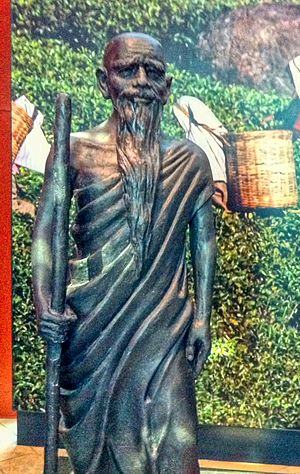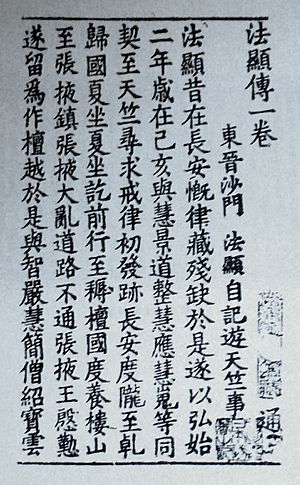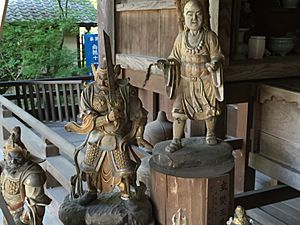Faxian facts for kids
Quick facts for kids Faxian |
|
|---|---|

An honorary Faxian statue in a Singapore museum.
|
|
| Religion | Buddhism |
| Other names | Fa-hsien, Sehi |
| Monastic name | Fǎxiǎn |
| Personal | |
| Born | 337 CE Pingyang Wuyang (平陽武陽), in modern Linfen City, Shanxi |
| Died | c. 422 CE (aged 85) |
| Parents | Tsang Hi (father) |
| Religious career | |
| Works | Foguoji (A Record of Buddhistic Kingdoms) |
| Faxian | |||||||||||||||||||||||||||||
|---|---|---|---|---|---|---|---|---|---|---|---|---|---|---|---|---|---|---|---|---|---|---|---|---|---|---|---|---|---|
| Chinese name | |||||||||||||||||||||||||||||
| Traditional Chinese | 法顯 | ||||||||||||||||||||||||||||
| Simplified Chinese | 法显 | ||||||||||||||||||||||||||||
|
|||||||||||||||||||||||||||||
| Japanese name | |||||||||||||||||||||||||||||
| Kanji | 法顕 | ||||||||||||||||||||||||||||
| Kana | ほっけん | ||||||||||||||||||||||||||||
|
|||||||||||||||||||||||||||||
| Sanskrit name | |||||||||||||||||||||||||||||
| Sanskrit | फा हियान | ||||||||||||||||||||||||||||
Faxian (born around 337 CE, died about 422 CE) was a famous Chinese Buddhist monk. He was also a skilled translator. Faxian is known for his amazing journey. He traveled by foot from China all the way to India. His goal was to find important Buddhist texts.
He started his long trip when he was about 60 years old. Between 399 and 412 CE, he visited many holy Buddhist places. These were in Central, South, and Southeast Asia. He spent 10 years of this time in India.
Faxian wrote a book about his travels. It was called A Record of Buddhist Kingdoms (Foguo Ji). His book is a special record of early Buddhism in India. He brought back many Sanskrit texts. These texts helped shape Buddhism in East Asia. They also give us clues about historical names and events.
Contents
Faxian's Amazing Journey
Faxian was born in Shanxi, China, in the 4th century. This was during the time of the Eastern Jin dynasty. His first family name was Gong. Later, he chose the name Faxian. This name means "Splendor of Dharma."
In 399 CE, Faxian began his journey to India. He was one of the first pilgrims to make such a trip. He set out with nine other people. They wanted to find sacred Buddhist writings. He walked from China across icy deserts and tough mountain passes.
He entered India from the northwest. He reached a city called Pataliputra. Faxian collected many Sanskrit Buddhist texts and images. When he returned to China, he translated these texts into Chinese.
Exploring Ancient India
Faxian visited India when Chandragupta II was king. He spent 10 years exploring the country. He visited all the main places linked to the Buddha's life. These included Lumbini, Bodh Gaya, Varanasi, Shravasti, and Kushinagar.
He also visited famous schools and Buddhist monasteries. Faxian learned the Sanskrit language. He collected Indian writings from Pataliputra, Oddiyana, and Taxila. His book talks about different types of Buddhism in India at that time. Before he left, he had gathered many important Sanskrit texts.
The Journey Home
After staying in Sri Lanka for two years, Faxian started his trip back to China. A big storm pushed his ship onto an island, probably Java. After five months there, he took another ship. This ship was headed for southern China.
But again, the ship was blown off course. He ended up landing at Mount Lao in northern China. This is near the city of Qingdao. Faxian spent the rest of his life translating and editing the scriptures he had collected. These texts greatly influenced Chinese Buddhism.
Faxian's Important Book
Faxian wrote a book called A Record of Buddhistic Kingdoms. It is also known as Faxian's Account. He finished it in 414 CE. His book is a special record of the places he visited. It describes the society and culture of ancient India around 400 CE.
His translations of Sanskrit texts are very important. They help us understand when certain historical events happened. They also tell us about important people and Buddhist traditions.
What Faxian Saw
Faxian wrote that cities in Central Asia, like Khotan, were Buddhist. The monks there read Indian writings in Indian languages. Local people respected the monks. In Taxila, he saw a strong Buddhist community. This was even though many people there were not Buddhists.
He described detailed ceremonies and public worship. Kings in India and Sri Lanka supported these events. Faxian left India around 409 CE from a port called Tamralipti. Some of his Chinese friends who came with him decided to stay in India.
Faxian wrote that people in Madhyadesha (central India) ate and dressed like Chinese people. He said that Pataliputra was a very rich city.
See also
 In Spanish: Fa Xian para niños
In Spanish: Fa Xian para niños
- Sects of Buddhism
- Silk Road transmission of Buddhism
- Chinese Buddhism
- Xuanzang
- Yijing (monk)
- Song Yun
- Hyecho
- Fa Hien Cave
- Great Tang Records on the Western Regions
- A Record of Buddhist Practices Sent Home from the Southern Sea
- Wang ocheonchukguk jeon
- Journey to the West
 | Selma Burke |
 | Pauline Powell Burns |
 | Frederick J. Brown |
 | Robert Blackburn |



